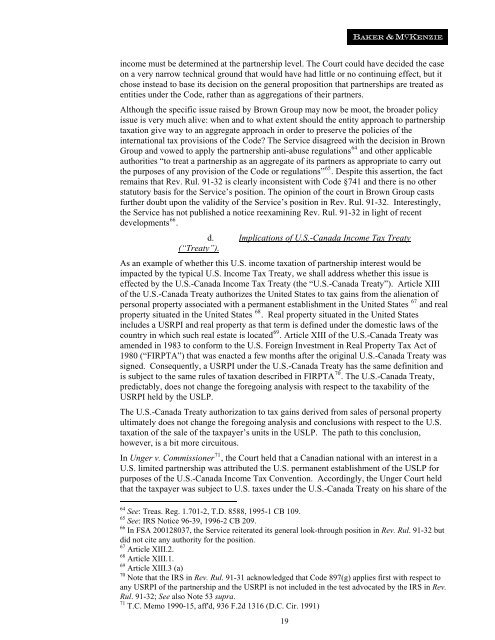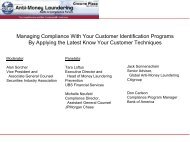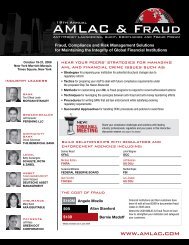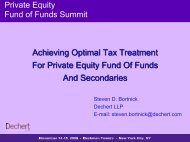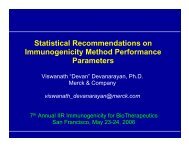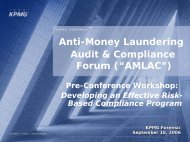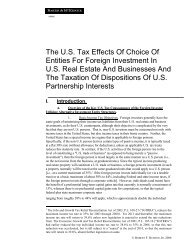The US Tax Effects Of Choice Of Entities For Foreign Investment - IIR
The US Tax Effects Of Choice Of Entities For Foreign Investment - IIR
The US Tax Effects Of Choice Of Entities For Foreign Investment - IIR
Create successful ePaper yourself
Turn your PDF publications into a flip-book with our unique Google optimized e-Paper software.
income must be determined at the partnership level. <strong>The</strong> Court could have decided the case<br />
on a very narrow technical ground that would have had little or no continuing effect, but it<br />
chose instead to base its decision on the general proposition that partnerships are treated as<br />
entities under the Code, rather than as aggregations of their partners.<br />
Although the specific issue raised by Brown Group may now be moot, the broader policy<br />
issue is very much alive: when and to what extent should the entity approach to partnership<br />
taxation give way to an aggregate approach in order to preserve the policies of the<br />
international tax provisions of the Code? <strong>The</strong> Service disagreed with the decision in Brown<br />
Group and vowed to apply the partnership anti-abuse regulations 64 and other applicable<br />
authorities “to treat a partnership as an aggregate of its partners as appropriate to carry out<br />
the purposes of any provision of the Code or regulations” 65 . Despite this assertion, the fact<br />
remains that Rev. Rul. 91-32 is clearly inconsistent with Code §741 and there is no other<br />
statutory basis for the Service’s position. <strong>The</strong> opinion of the court in Brown Group casts<br />
further doubt upon the validity of the Service’s position in Rev. Rul. 91-32. Interestingly,<br />
the Service has not published a notice reexamining Rev. Rul. 91-32 in light of recent<br />
developments 66 .<br />
d. Implications of U.S.-Canada Income <strong>Tax</strong> Treaty<br />
(“Treaty”).<br />
As an example of whether this U.S. income taxation of partnership interest would be<br />
impacted by the typical U.S. Income <strong>Tax</strong> Treaty, we shall address whether this issue is<br />
effected by the U.S.-Canada Income <strong>Tax</strong> Treaty (the “U.S.-Canada Treaty”). Article XIII<br />
of the U.S.-Canada Treaty authorizes the United States to tax gains from the alienation of<br />
personal property associated with a permanent establishment in the United States 67 and real<br />
property situated in the United States 68 . Real property situated in the United States<br />
includes a <strong>US</strong>RPI and real property as that term is defined under the domestic laws of the<br />
country in which such real estate is located 69 . Article XIII of the U.S.-Canada Treaty was<br />
amended in 1983 to conform to the U.S. <strong>For</strong>eign <strong>Investment</strong> in Real Property <strong>Tax</strong> Act of<br />
1980 (“FIRPTA”) that was enacted a few months after the original U.S.-Canada Treaty was<br />
signed. Consequently, a <strong>US</strong>RPI under the U.S.-Canada Treaty has the same definition and<br />
is subject to the same rules of taxation described in FIRPTA 70 . <strong>The</strong> U.S.-Canada Treaty,<br />
predictably, does not change the foregoing analysis with respect to the taxability of the<br />
<strong>US</strong>RPI held by the <strong>US</strong>LP.<br />
<strong>The</strong> U.S.-Canada Treaty authorization to tax gains derived from sales of personal property<br />
ultimately does not change the foregoing analysis and conclusions with respect to the U.S.<br />
taxation of the sale of the taxpayer’s units in the <strong>US</strong>LP. <strong>The</strong> path to this conclusion,<br />
however, is a bit more circuitous.<br />
In Unger v. Commissioner 71 , the Court held that a Canadian national with an interest in a<br />
U.S. limited partnership was attributed the U.S. permanent establishment of the <strong>US</strong>LP for<br />
purposes of the U.S.-Canada Income <strong>Tax</strong> Convention. Accordingly, the Unger Court held<br />
that the taxpayer was subject to U.S. taxes under the U.S.-Canada Treaty on his share of the<br />
64 See: Treas. Reg. 1.701-2, T.D. 8588, 1995-1 CB 109.<br />
65 See: IRS Notice 96-39, 1996-2 CB 209.<br />
66 In FSA 200128037, the Service reiterated its general look-through position in Rev. Rul. 91-32 but<br />
did not cite any authority for the position.<br />
67 Article XIII.2.<br />
68 Article XIII.1.<br />
69 Article XIII.3 (a)<br />
70 Note that the IRS in Rev. Rul. 91-31 acknowledged that Code 897(g) applies first with respect to<br />
any <strong>US</strong>RPI of the partnership and the <strong>US</strong>RPI is not included in the test advocated by the IRS in Rev.<br />
Rul. 91-32; See also Note 53 supra.<br />
71 T.C. Memo 1990-15, aff'd, 936 F.2d 1316 (D.C. Cir. 1991)<br />
19


